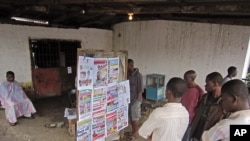Press freedom declined in Africa and around the world in 2015, according to a new report by the monitoring and advocacy group Freedom House.
The worst clampdown on the African continent took place in Burundi, a Great Lakes nation where efforts by the president to extend his time in office beyond constitutional limits have pushed the country to the brink of civil war. There, journalists have been imprisoned, beaten and killed and nearly all independent media outlets have been shut down.
Worldwide, press freedom dropped to the lowest recorded level in 12 years, Freedom House said.
“Steep declines worldwide were linked to two factors: heightened partisanship and polarization in a country’s media environment, and the degree of extralegal intimidation and physical violence faced by journalists,” Freedom House wrote in its report released Wednesday.
Two African countries were named to what Freedom House calls its “worst of the worst” list based on overall performance. Eritrea was ranked fifth from the bottom and Equatorial Guinea came in eighth from the bottom.
Jennifer Dunham, the director of research for Freedom of the Press and Freedom in the World at Freedom House told VOA that countries like Eritrea remain on the worst list because all private news outlets have been outlawed. “Where once there was a vibrant private press, key editors and journalist are imprisoned, some for several years and there is no law guaranteeing freedom of the press, I mean the laws are on the books but they are not in practice at all,” she said.
Eritrea has recently allowed foreign correspondents from outlets including the BBC, Reuters and France 24 to enter the country and report on certain subjects and in designated areas. However, Dunham said local media is strictly controlled and journalists remain in prison. “Until Eritrean reporters are able to do any kind of reporting, especially free independent reporting in which they could criticize their government without fear of reprisal, then there will be no press freedom in the country,” she said.
Dunham noted a disturbing trend of increased restrictions spreading across East Africa. She said this began in Ethiopia where a group known as the Zone 9 bloggers were imprisoned before being released. She believes the lack of vocal international condemnation of Ethiopia’s restrictions has emboldened crackdowns in neighboring countries. “I think the trends that started in Ethiopia and Eritrea are spreading toward the rest of East Africa,” she said. She pointed out that countries like Uganda, Kenya and Tanzania that previously had expansive press freedoms are now seeing tightening of laws on the press. In some cases laws designed to prosecute terrorists are being used to target reporters and political dissidents, she said.
Felix Horne, a researcher focusing on the Horn of Africa for Human Rights Watch, said surveillance of communications is particularly strong in Ethiopia where the government taps and records phone calls without warrants and uses spyware to track online activity of people domestically and in the global diaspora. “What those tools essentially do is give the government complete control over the person’s computer,” Horne told VOA prior to the release of the report. “They can record Skype conversations, they can see what files they’re accessing, their emails, they can gather their passwords, they can turn on the webcam and see what that person is doing, so this is very powerful spyware.” In some cases, he added, people have been arrested under suspicion of speaking to members of the international media.
There were, however, some rays of light among the doom and gloom. The East African Court of Justice, a judicial body established by the East African Community ruled against a repressive media law in Burundi. Similarly, the Economic Community of West African States Court of Justice is hearing arguments in a case brought by the Federation of African Journalists against Gambia and its libel laws designed to muffle the press.
“These laws are against charters, African charters that have been signed by these countries and so that they don’t see it as a Western group that is saying this but that this is an African court saying that these laws are against the charters, the African charters that have been signed,” Dunham said.
Freedom House’s annual report titled “Freedom of the Press 2016” evaluates the status and degree of media freedom in 199 countries and territories across the world.




